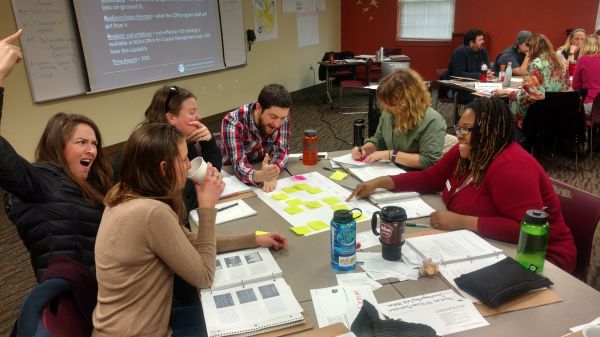Working on Cultural Competency: Being the only one in the room

Last month I attended a wonderful training. The training was called Coastal Restoration Project Design and Evaluation and was led by a team from the National Oceanic and Atmospheric Administration. The training covered topics like project planning, how to use logic models, project evaluation and how to create a seamless project designs that would be attractive to funders. This workshop had excellent information and was well conducted with lots of activities and time for thought and reflection.
As I sat in this training, getting all of this great information, I noticed something that frankly I should be used to by now. I was the only person of color (POC) in the room. As an African American environmental educator this is not an unusual situation. When I attend meetings about how to better educate people about our environment, I'm usually the only one in the room. When I go to amazing conferences that give me great information about how to be a better educator, I'm usually the only one in the room. When I sit on committees that decide who's going to get funding for community impact projects, I'm usually the only one in the room. It's a situation that I've gotten used to. These days I'm seldom uncomfortable.
The unequal representation of people of color in environmental work is a situation that many of us know needs to change. We realize that in order to make real impact on the environmental issues that affect us all, we all need to be a part of the conversation. However we are often stumped about how to correct this issue. Many organizations want to reach minority populations, but have trouble making those connections. I think one of the main issues with trying to reach other populations is that we expect them to come to us. Have you ever created what you considered to be the perfect program, backed by full grant funding, and had no one show up? Sometimes as nonprofits organization we get into the mindset of if we build it they will come. The truth is we need to go to them.
A part of being ecoinclusive is working on our personal cultural competency. I would challenge that if you really want to make connections with a culture that different from your own, you should try being the only one in the room. Put yourself in social situations where you are the only one of your cultural group in attendance. And if you really want to be culturally competent do it multiple times.
I'm going to let you know now, if you choose to be the only one in the room, it's going to be hard. You're going to be uncomfortable. You might feel unwanted. You may feel out of place. But that's okay. Be uncomfortable. Get past it. It's when we are uncomfortable that the hard work surrounding cultural differences and race and ethnicity really begins. It's not going to be easy and you may have to do it several times to begin to feel comfortable.
Here are some survival tips for being the only one in the room. If you have any added insight or suggestions please add them in the comment section.
- Use common sense and sensitivity. You may not immediately understand the reasons for someone's behavior, however being friendly and open minded can go a long way new situations.
- Don't shut down or tune out. If you hear something "offensive" to you, fight the urge to shut down and stop listening or immediately start defending yourselves. Keep an open mind.
- Appreciate differences in communication styles and values; don't assume that the majority's way is the right way.
- Listen and learn. Don’t dominate the space or conversation. This is someone else’s space do not dominate it with your own cultural context.
- Keep your bias in check. Examine your biases about people from other cultures. We all carry misinformation and stereotypes about people in different cultures. But in order to build relationships with people of different cultures, we have to become aware of the misinformation we acquired.
- Take some time after the event to reflect on your experiences. If you have a diverse friend or colleague that you feel comfortable speaking with about your experience, share and ask questions.
- Know that you will be initially uncomfortable, but that just means that you are learning something new and are growing as a culturally competent person.


Comments
Thank you so much for this post! I give this a million+ likes! As an African American who works in the environmental field and is usually the "only one", I hear this question, "How do we get more people of color to come to our sites/programs?" all of the time! I'm going to refer them to your post!
I love these tips. As a white person working in EE, I'm often surrounded by people who look like me and your encouragement to step out of my comfort zone, along with your very concrete tips, are helpful. Thank you for this post!
Thank you very much for your survival tips. They are on point and incredibly helpful.